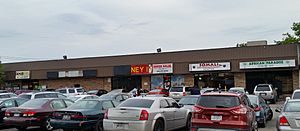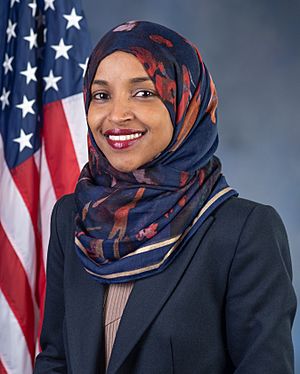Somali Americans facts for kids
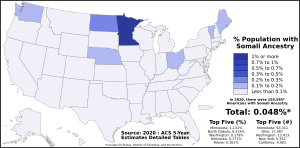
Percent of the population with Somali ancestry by state
|
|
| Total population | |
|---|---|
| 182,951 (2019) Total Somali ancestry 76,205 (2008-2012) Somalia-born |
|
| Regions with significant populations | |
| Languages | |
| Religion | |
| Sunni Islam | |
| Related ethnic groups | |
| Somali Canadians |
Somali Americans are people living in the United States who have Somali family roots. Many Somalis first came to the U.S. as sailors in the 1920s. Later, students arrived in the 1960s and 1970s to study. The biggest wave of Somalis came in the 1990s. This happened when a civil war started in their home country of Somalia. Today, the Somali community in the U.S. is one of the largest groups of Somalis living outside Somalia.
Contents
History of Somali Americans
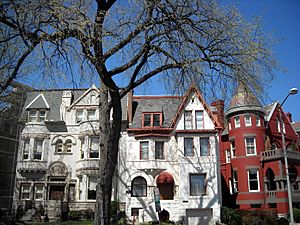
The very first Somalis to come to the United States were sailors. They arrived in the 1920s, mostly from a place called British Somaliland. These early immigrants became American citizens. They even helped with Somalia's fight for independence. When Somali leaders visited the United Nations (UN), these Americans helped them. The Somali government honored them for their help. Some even received land back home.
After Somalia became independent in 1960, more Somalis came to the U.S. These were often students who wanted to go to college. Many of them went back to Somalia after finishing school. They played a big part in helping their country grow. In the 1980s, a small number of Somalis settled in the U.S. Later, many more came seeking safety. They were escaping the civil war in Somalia. Others moved from different parts of Greater Somalia.
A large number of Somali immigrants chose to live in Minnesota. By 2002, Minnesota had the biggest Somali population in North America. Many new arrivals got help from special agencies. These agencies worked with the U.S. State Department to help them settle in. By 2006, Somalis in Minnesota had a lot of buying power. They also owned about 600 businesses. The city of Minneapolis has many businesses owned by Somalis. In 2015, about 57,000 people in Minnesota had Somali family roots. About 31,400 of them were born in Somalia.
Somalis in the United States often send money to their families abroad. This money helps their relatives back home. In 2012, the situation in Somalia became much safer. Because of this, many Somali Americans started going back to Mogadishu. This is the capital city of Somalia. Many of these people returned to invest and help rebuild the country. They are helping to fix schools, hospitals, and roads. They have played a big role in Mogadishu's recovery. They have also helped the local housing market grow.
Where Somali Americans Live
It's hard to know exactly how many Somali immigrants live in the United States. Estimates range from about 35,000 to 150,000 people. Data from 2010 shows about 85,700 people with Somali family roots in the U.S. About 25,000 of them live in Minnesota. Most of those were born in Somalia. Across the whole country, about 76,205 people were born in Somalia. Somalis are the second largest group from the Horn of Africa in the U.S. Ethiopians are the largest.
From 2008 to 2012, the most Somalis born in Somalia lived in the Minneapolis-St. Paul-Bloomington area of Minnesota. Other cities with many Somali Americans include:
- Columbus, Ohio
- Seattle-Tacoma-Bellevue in Washington
- San Diego-Carlsbad-San Marcos in California
- Washington, D.C.-Arlington-Alexandria in the Virginia-D.C. area
- Atlanta-Sandy Springs-Marietta in Georgia
- Phoenix-Mesa-Glendale in Arizona
- Portland-Vancouver-Hillsboro in Oregon
- Nashville-Davidson-Murfreesboro-Franklin in Tennessee
- Boston-Cambridge-Quincy in Massachusetts
In 2014, the Minneapolis City Council voted to make July 1 Somali American Day. This day celebrates Somalia's Independence Day. The council also made Minneapolis and Bosaso in Somalia sister cities. This means they have a special friendly relationship. The Federal Government of Somalia also said it would start counting Somalis living abroad.
Work and Jobs
Some Somali refugees in the U.S. have found it hard to find jobs. In 2010, about 47% of Somalis in Minnesota had jobs. About 13% were looking for work. The rest were not actively working. For comparison, about 6% of all foreign-born people in Minnesota were unemployed. However, the unemployment rate for Somalis in Minnesota is lower than for Somalis in cities like London or Toronto. From 2011 to 2015, about 58% of working-age Somali Americans had jobs. About 5.1% owned their own businesses.
Community Groups
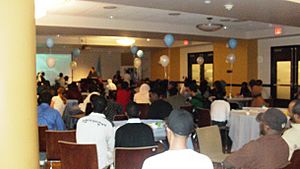
Many groups run by Somalis help the Somali community in the United States. Somali Community Services in San Jose helps new Somali families. The Somali American Council of Oregon (SACOO) also helps. These groups work with city leaders to build good relationships. The Somali Community Access Network (SomaliCAN) helps the Somali community in Columbus, Ohio. In Minnesota, groups like the Confederation of Somali Community in Minnesota (CSCM) offer social services. The Somali American Parent Association (SAPA) and Somali Action Alliance also help.
In politics, there is a Somali American group in the Minnesota Democratic–Farmer–Labor Party (DFL). This group helps represent the Somali community. A Somali American also leads the Immigrant Relations Committee for the Republican Party in Minnesota.
Diplomatic Offices
Somalis in the United States are represented by the embassy of Somalia in Washington, D.C. The embassies of Djibouti and Ethiopia also help ethnic Somalis living in the capital. The self-declared republic of Somaliland also has an office in Washington.
Famous Somali Americans
- Barkhad Abdi, an actor, nominated for an Academy Award
- Mohamed Abdullahi Mohamed, a diplomat and professor, former President of Somalia
- Ilhan Omar, a congresswoman, the first Somali American elected to the U.S. House of Representatives
- Dahir Adan Elmi, Chief Commander of the Somali National Army in the 2000s
- Mohammad Ali Samatar, former Somali Prime Minister from 1987–1990
- Ali Khalif Galaydh, a Somali Politician and former Minister in the 1980s
- Abdiweli Mohamed Ali, an economist and former Somali Prime Minister
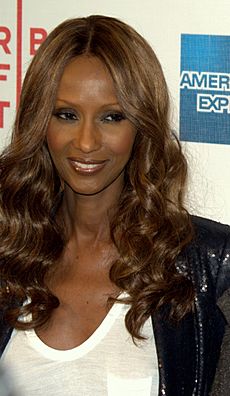
- Abdinur Sheikh Mohamed, educator and politician, former Minister of Education of Somalia
- Abdirahman Duale Beyle, economist, former Minister of Foreign Affairs of Somalia
- Abdisalam Aato, film director, producer, and entrepreneur
- Abdisalam Omer, economist, Minister of Foreign Affairs of Somalia
- Abdullahi Ahmed Irro, professor, retired Somali general
- Alisha Boe, actress
- Asha Ahmed Abdalla, politician, former member of the Transitional Federal Parliament
- Asli Hassan Abade, military pilot
- Ayaan and Idyl Mohallim, fashion designers
- Ayaan Hirsi Ali, writer and political activist
- Deqa Dhalac, Mayor of South Portland
- Halima Aden, supermodel
- Hassan Ali Mire, politician, former Minister of Education of Somalia
- Hodan Ahmed, political activist
- Fatima Jibrell, environmental activist
- Idil Ibrahim, film director, producer, and entrepreneur
- Iman, supermodel, actress, and entrepreneur
- Jawahir Ahmed, fashion model
- Muna Khalif, fashion designer and politician
- Musse Olol, social activist
- Nuruddin Farah, writer
- Raqiya Haji Dualeh Abdalla, sociologist and politician
- Saado Ali Warsame, singer-songwriter and politician
- Said Sheikh Samatar, scholar, historian, and writer
- Sofia Samatar, professor, editor, and writer
See also
- Somali diaspora
- Dalmar TV, a Somali-language television network
- History of the Somalis in Minneapolis–Saint Paul
- Somalia–United States relations


